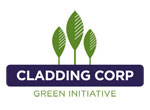 Sustainability in Practice
Sustainability in Practice
Since the earliest days of our company, we have held a strong commitment to sustainable design practices. The components of our engineered rainscreen assemblies for terracotta, fiber cement, and ceramic stone demonstrate certain attributes that can assist owners and designers in achieving LEED® certification. Our systems are LEED® compliant specific to the Recycled Content of the aluminum components we use and Cladding Corp certifies that our aluminum components incorporate a minimum of 45-70% post-consumer recycled content and 5-10% post-industrial recycled content by weight.
In terms of specific LEED® Advantages:
- SS Sustainable Sites: SS_7.1 Heat Island Effect (non-roof) – use of colors with a low Solar Reflectance Index (SRI) or shading devices to reduce the heat absorption of exterior materials – 1 point potential
- MR Materials & Resources: MR_4.1 & MR_4.2 (recycled content, based on % of cost) – up to 2 points depending upon design
- EA Energy & Atmosphere: EA _1 (optimization of energy – improve the design from 12% to 48%) – from 1 to 19 credits depending upon how much our system contributes to optimizing the overall building performance (1-4 reasonable if we are primary cladding)
- IEQ Indoor Environmental Quality: (Thermal Comfort) IEQ_7.1 (design of envelope) & IEQ_7.2 (verification) – up to 2 points
- ID Innovation in Design: ID_1 for Carbon Neutral Shipping program – up to 5 points depending upon the extent of our carbon offsetting
Our Support of Carbon Zero Design
In an effort to reduce the carbon footprint of our cladding systems, Cladding Corp continues to implement new programs to help sustain this effort. From architectural binders and marketing materials printed on 100% recycled content, chlorine-free paper to providing all of our specifications, design details, and marketing collateral in electronic formats, we are committed to sustainability and understand that it starts with corporate and personal responsibility – one decision at a time.
Future endeavors include a Net Zero Carbon Shipping Pilot Program through truck stop electrification that will utilize carbon credit offsetting techniques to create a significant impact from carbon dioxide emissions and offsetting both panel and subframing manufacturing process to create a complete cladding system that can be considered Carbon Neutral.
